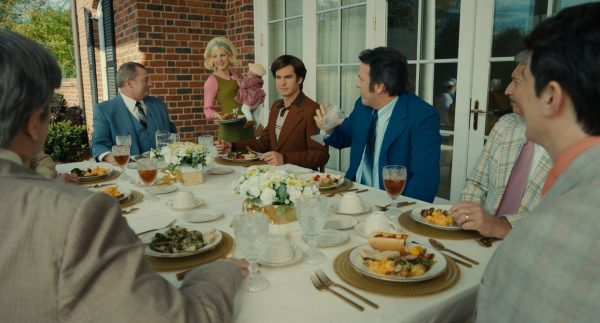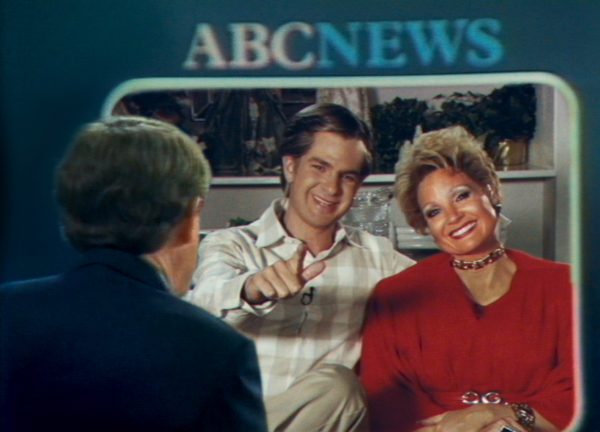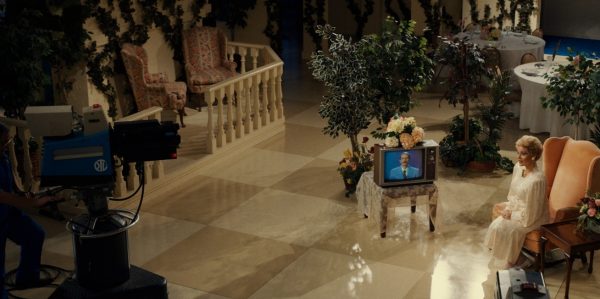
“The Eyes of Tammy Faye” (2021). Cast: Jessica Chastain, Andrew Garfield, Cherry Jones, Vincent D’Onofrio, Sam Jaeger, Mark Wystrach, Fredric Lehne, Louis Cancelmi, Gabriel Olds, Chandler Head, Jay Huguley, Randy Havens, Dan Johnson. Archive Footage: Ronald Reagan, Ted Koppel, Tom Brokaw, John Chancellor, Garrick Utley, Maria Shriver. Director: Michael Showalter. Screenplay: Abe Sylvia. Source Material: Fenton Bailey and Randy Barbato, documentary, “The Eyes of Tammy Faye” (2000). Web site. Trailer.
It’s one thing to be an ardent, committed supporter, but it’s something else entirely to be an unwittingly blind follower. The former reflects a passionate faith and a stern resolve, while the latter is an unquestioned abrogation of one’s personal power. But certainly one can readily make the distinction between those two scenarios, right? Don’t be so sure. Such are the circumstances that characterize the life of a once-powerful and respected television personality as seen in the new, fact-based film biography, “The Eyes of Tammy Faye.”
From almost the time she was born in International Falls, Minnesota in 1942, Tammy Faye LaValley (Chandler Head) sought love, recognition and acceptance. That was hard coming, though, given the shame that was heaped on her by her own mother, Rachel (Cherry Jones), a divorcee who was so embarrassed by her status that she projected it onto her daughter, claiming that Tammy Faye was a reminder of her own “sordid” past. Rachel was so dogmatic about the disgrace of being divorced, in fact, that she wouldn’t even allow Tammy Faye to attend the church where she played piano for fear that her presence in the congregation would serve as a reminder to the parishioners that she was a “fallen woman” (this in spite of the fact that Rachel was married at the time her daughter was born and that she was now wed to her second husband, Fred (Fredric Lehne)). Tammy Faye, meanwhile, desperately wanted to attend services so that she could feel the love of Jesus, the kind of unconditional acceptance that she wasn’t receiving at home. And, when she finally made an appearance at church against her mother’s instructions, she underwent a religious experience that filled her with what had been missing all along, an event that parishioners looked upon as a miracle while Rachel gazed on in consternation.
This experience would come to define Tammy Faye’s character for the remainder of her life. Having now received the acceptance she had long been looking for, it was easy for her to return the favor in kind to others, a belief that essentially enabled her to love everyone. This outlook thus led an adolescent Tammy Faye (Jessica Chastain) to her calling as a charismatic disciple of Christ, enrolling as a student at North Central Bible College in Minneapolis. It’s there where she met an aspiring young evangelist named Jim Bakker (Andrew Garfield), who preached a gospel that maintained Jesus wanted His followers to live lives of abundance and prosperity, not poverty and suffering. This uplifting message captivated the impressionable young Tammy Faye, and she was eager to follow Jim in what he was setting out to do, a goal made easier after they married in 1961.

Before long, Jim and Tammy Faye took their ministry on the road, holding prayer meetings across the American South. Jim preached his message, while Tammy Faye sang and staged Christian puppet shows for children. After several years, they took their message to television, becoming long-time fixtures on the Christian Broadcasting Network (CBN), the religious TV empire founded by evangelist Pat Robertson (Gabriel Olds), serving as hosts of The 700 Club, a Christian talk show, and Jim and Tammy, a popular children’s show.
As the Bakkers’ reputation began rising, they became part of an inner circle of powerful evangelists, most notably Jerry Falwell (Vincent D’Onofrio), head of the Moral Majority and co-founder of Liberty University. Falwell unapologetically promoted a “traditional values” agenda that was pro-life, pro-family, anti-gay and segregationist in nature. And, given the clout that leaders like Robertson and Falwell commanded, Jim seemed willing to go along with their views if it would help to advance his cause. However, given Tammy Faye’s willingness to embrace all souls, she was reluctant to follow suit; she couldn’t abide by such close-minded thinking.

This marked perhaps the first time when Tammy Faye didn’t blindly follow her husband’s wishes. But, rather than argue with him about their differences in opinion, she instead encouraged Jim to strike out on his own and build his own network, which he subsequently did with the founding of The PTL Club (Praise The Lord) in 1974. This glitzy Christian news and entertainment program featured a variety of guests, provided a showcase for Tammy Faye’s musical talents and put in place a platform for Jim to preach his prosperity gospel. And, as their own prosperity soared during the ’70s and ’80s, Tammy Faye once again blindly went along with whatever Jim wanted, even when it wasn’t necessarily in her own best interests, both personally and professionally.
Despite widely held contentions that the Bakkers were doing great charitable work through their ministry, there were also allegations about where the money was coming from for all of these undertakings – not to mention the funding of their increasingly lavish personal lifestyle. Tammy Faye added her own fuel to this fire by expressing views that ran counter to what most evangelicals held dear. This became most apparent during her emotional on-air interview with Steve Pieters (Randy Havens), an openly gay man suffering from AIDS. Tammy Faye said it was just another expression of her love for everyone, a view that ran afoul of the likes of Falwell, whom Jim was leaning on increasingly to help bail him out of the growing controversy.
When events finally exploded, Tammy Faye had become an emotional wreck, strung out on a cocktail of Diet Coke and Ativan. What’s more, because of Jim’s financial misdeeds, she was facing the loss of virtually all of her wealth and material possessions. And, to make matters worse, claims that Jim had engaged in homosexual affairs arose, shattering whatever remaining romantic feelings she had left for him and leading to divorce (and jail time for her husband) not long thereafter.
After such a dramatic rise, Tammy Faye took quite a hard – and very public – fall. She became a walking punchline, lampooned on many TV talk shows and sketch comedy programs. Her signature heavy facial makeup and teary, emotional speaking delivery provided ample fodder for jokes on everything from tee shirts to newspaper cartoons. Recovering from that kind of humiliation seemed almost impossible. But the resilient Tammy Faye sought to redeem herself, no matter what it took. Most of all, she wanted to continue to let others know that she loved them and that she would do so no matter how much vitriol was flung in her direction. It was a lesson she learned early on in life, and it was one she was not about to give up now.

Even though Tammy Faye was subjected to considerable criticism for what happened, both from holier-than-thou conservative constituents and rigidly self-righteous liberal opponents, the film reveals that much of what occurred actually stemmed from guilt by association. By implicitly and naïvely trusting her husband, rarely questioning his actions and willfully looking away when convenient, she ended up in the middle of controversies that were largely not of her own doing, sadly making her a pitiable but sympathetic character.
This is not to suggest, however, that Tammy Faye didn’t err along the way. Those missteps were generally attributable to her vast naïvete, a seemingly boundless Pollyanna attitude fueled by beliefs designed to bring it into being. And that’s crucial to understanding why events unfolded as they did, for our thoughts, beliefs and intents drive the conscious creation process, the philosophy that maintains we draw upon these resources in manifesting our reality and everything found within it. Tammy Faye may have never heard of this school of thought, but her experience certainly shows that she was proficient at practicing its principles.
As the conditions of her childhood show, the obvious lack of love and acceptance that Tammy Faye experienced went a long way into shaping her views about life. She clearly didn’t want to subject others to what she endured, so, when she finally found what was missing through her connection with Jesus, she wanted to freely share that joy and fulfillment with everybody. What’s more, when she met her future husband, who seemingly held a comparable outlook, she gave herself over to him and his plans for their life together.
Noble as these notions may be, however, they weren’t without pitfalls. By treating such beliefs and associated undertakings as implicit absolutes, she stepped into some major traps. For starters, these were ultimately disempowering acts. She ended up surrendering her personal power, regardless of whether she had consciously intended to do so, a commodity that can be difficult to retrieve once lost. On top of this, given her unwavering loyalty and indiscriminately trusting nature, she was willing to follow those whom she believed in, no matter what that may have involved. And that, as the film shows, set her up for trouble.

These circumstances illustrate the clear distinction of having faith from practicing blind faith. While there’s much to be said for the former, especially when it comes to forging powerful manifestation beliefs, the latter can lead us down a slippery slope from which recovery can prove to be difficult if not seemingly impossible. Retracting our lost power in these situations is often problematic, partly because we may have come to believe that such a goal is unattainable or that it requires considerable effort to rebuild, which may not be adequate enough in light of what we’re up against.
So what are we to do? Under circumstances like these, the wisest course is not to fall into such traps in the first place. We can do that by making adjustments in our outlooks up front, particularly when it comes to engaging our power of discernment. While adopting qualified beliefs can cause issues, so, too, can adopting them in unqualified, unquestioned forms. Doing so almost suggests an attitude of not caring, as if we couldn’t be bothered to take the time to examine what should be ruled out before recklessly embracing those notions. Such an approach can lead to the practice of un-conscious creation or creation by default, where we’re so preoccupied with following a course at all costs that we ignore what other conditions (including unintended side effects) might accompany our creative initiatives. Tammy Faye, unfortunately, learned this the hard way.

Still, this is not to imply that all is lost either. Redemption and resilience are possible, provided that we believe in those possibilities. Tammy Faye sought this in the wake of her widely publicized downfall, and she managed to bounce back. For example, when Jim lost interest in Tammy Faye and his alleged same-sex dalliances surfaced, she drew others to her to make up for this, such as music producer Gary Paxton (Mark Wystrach) and construction contractor Roe Messner (Sam Jaeger). She knew what it was like to go without love and what it was like to fill that void, skills – backed by suitable beliefs – that she knew how to implement when needed. These undertakings employed those aforementioned qualities of redemption and resilience, and she was able to draw upon the beliefs underlying them – and even transfer them to other aspects of life – when needed. That represented a significant change from the blind faith she practiced earlier in her life and set an impressive example for all of us to follow when we need to make comparable alterations in our own lives.
Rebounding from a humiliating fall from grace may seem like an overwhelming task. But, as director Michael Showalter’s biopic illustrates, turnarounds are not out of the question. The film addresses the many trials and tribulations of the protagonist’s life, most of which are depicted quite capably, though there are a few segments where Jim and Tammy Faye are portrayed more like caricatures than characters, as well as a few others that could have been better focused. Nevertheless, despite these pitfalls, this offering features award-worthy performances by Chastain and Garfield as the celebrated TV couple and Jones as Tammy Faye’s hard-edged, tough-loving mother. It also presents a refreshingly balanced look at the protagonist’s life, poking fun with rapier wit and high camp when needed, but also sincerely painting Ms. Bakker in a surprisingly and deservedly justified sympathetic light. This latest release in the film biography genre may not be perfect, but then neither was Tammy Faye’s notoriously over-the-top makeup routine. In either case, though, that doesn’t mean this release won’t bring a smile – or mascara-laden tear – to your face. “The Eyes of Tammy Faye” has played at several film festivals and is now in general theatrical release.
Going along with what others want without taking a critical look at what’s proposed can be a perilous course. Throwing support behind individuals and causes we care about is certainly fulfilling and ennobling. However, when we cross the line from loyal advocate to unwitting stooge, we veer into troubling territory from which escape can be difficult. That’s why it’s so important that we place faith in ourselves, for it enables us to make valuable distinctions that could end up saving our lives and reputations before all is lost – and perhaps unattainable to retrieve.
Copyright © 2021, by Brent Marchant. All rights reserved.

No comments:
Post a Comment